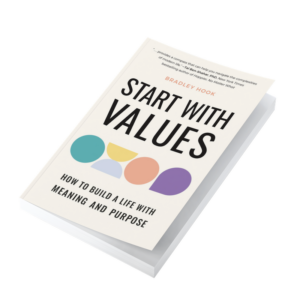Every significant decision brings tension. On one side: the comfort of the known. On the other: uncertainty, with no guarantees. Even considering the unknown can generate stress. The mind moves constantly—revisiting the past to analyze and ruminate, projecting into the future to plan, worry, and imagine.
To the body, thought and reality are often indistinguishable. Simply anticipating an uncertain future can trigger the same distress as a real crisis. When discomfort arises, our evolutionary wiring favors retreat—seeking the familiar, even if imperfect. This impulse toward safety often keeps us from making real changes. The anxiety provoked by imagining a different future can feel paralyzing, sometimes stopping us before we even begin. This is a normal, deeply human response; it served our ancestors well when real danger lurked.
Reckoning with Change
For many, major life changes happen only when necessity forces our hand: a health crisis, loss, or some collapse of the present. Only when the status quo becomes intolerable does the unknown start to look like a reasonable option. But what if we evaluated our choices through the lens of possibility and future satisfaction, not just fear?
Consider a common situation: a stable job that fits your skills, with a predictable path. Over time, you’ve taken on the obligations of adulthood—a mortgage, family, car payments, and bills. Yet, a sense of emptiness persists. As the years pass, you wonder: is this really it?
Material comforts rarely fill that inner void. Many seek relief in distractions—sometimes alcohol, sometimes escapism. But if your life lacks meaning, nothing external can truly satisfy.
So you stand at a threshold. Security and safety tug you back toward the known. Your mind spins out possible futures; your body responds with fear, urging caution. This is instinct at work. But there is another way forward: using your values as a guide. If you’re unsure what matters most to you, resources like The Values App can help clarify your core priorities.
Making Decisions Anchored in Values
Once you’ve clarified your values, bring them into the decision-making process. The Values App, for example, asks you to rank your values, creating a hierarchy that can guide tough choices. Returning to our scenario: the stable job brings security, but leaves you unfulfilled. The alternative—starting a business—offers new possibilities, but also risk.
Imagining an uncertain future can spike cortisol, the body’s main stress hormone. But when we envision a future aligned with our hopes, the body responds positively—dopamine and oxytocin increase, and things can feel possible. Our feelings shape our actions more than we often admit.
So, how do you let values steer your choices?
Suppose your top three values are creativity, freedom, and family. Many facing this crossroads will recognize themselves in this list.

Consulting Your Future and Past Selves
Try looking ahead ten years. This calls for self-empathy. Who will you be a decade from now? To get perspective, look back ten years. Most of us wince at our younger selves—maybe naive, maybe unpolished, but also vibrant and creative. Over time, that creativity can be traded for stability. Your future self will look back on you now, too. Are you content with where you are? What, if anything, do you regret not doing?
If your past self had truly lived by your core values—creativity, freedom, family—where might you be today? Sacrifice is inevitable; it gives victories meaning and depth.
Reflecting on my own path, I see that I’ve often set aside freedom and creativity for family. Building a career and providing stability has been essential for us. Raising a young child is demanding, and financial security can ease some of that strain.
Now, my imagined future self reminds me that time is finite. For years, I prioritized family above all. That was right for that chapter. But now, I need to trust my accumulated skills and consider taking the leap. What’s the real risk? Not finding another job? The nature of work itself is changing—staying put may be riskier than venturing out. Perhaps the greater danger is inertia, not failure. Choosing freedom over safety is a recurring decision, relevant in every facet of life.
There’s a quiet power in looking back and realizing that many anxieties were unnecessary. Worry is sometimes useful, but unchecked, it can become its own obstacle. Visualization—imagining a future grounded in your values—can help move through fear. And remember: not every decision must be all or nothing. You might, for example, shift to part-time work to pursue a side project, or reallocate time and resources toward new efforts gradually.
Life as a Series of Prototypes
Values clarify and support decision-making, helping us move through our natural resistance to change. The point is not to prescribe a single right answer, but to offer a framework for weighing what matters most in any given moment.
Use your mind’s capacity to “time travel” intentionally—reflecting on past and future selves, and treating yourself with the same support you’d offer a close friend. You are, ultimately, your own best ally. Offer reassurance to both your past and present selves.
Think of your life as a series of prototypes. Can you build a small experiment, test, and learn? This approach can spare you years of regret. There are rarely quick fixes or easy wins. Sometimes, the best move is to find purpose in your current environment and reframe the situation.
Meaning often emerges through challenge, not comfort. Align your pace with nature’s; tend to your body, acknowledge your emotions, and clear your mind.
Give yourself the benefit of the doubt. Practice intentional reflection, rather than letting your mind default to anxious loops.
A Framework for Values-Based Decisions
- Know yourself: Identify and rank your core values.
- Reflect on how your past actions did—or did not—align with those values.
- Consider your future self: Will you be proud of the choices you make now? Are you preparing the ground for a meaningful life?
- Frame your current dilemma through your values. What does each option look like when filtered this way?
- Weigh the cost of inaction. Might you regret staying on your current path? Will your future self resent missed opportunities? What’s the worst—and best—possible outcome?
- Hold perspective: Life is brief, a moment in vast time. In a few generations, none of this will be remembered. But right now, you have the chance to experience, to create, to connect. Treat existence as the remarkable opportunity it is, and meaning will follow.


